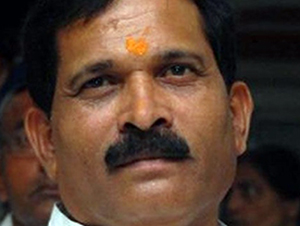New Delhi, May 25: Seeking to dispel the controversy over chanting of 'Om' during the World Yoga Day programme, Ayush Minister Shripad Naik today said there was "no compulsion" to say it.
The ministry said there is no change even in "a full stop or a comma" in the protocol of exercises performed last year and that Surya Namaskar will also not be a part of the yoga day programme. However, this year the programme will be extended by 10 minutes.
"Om is a universal word. There is no religious connotation to it. It will be a part of the yoga day programme just like last year, but it has not been made compulsory. Those who want to chant 'Om' can do it. Others can say something else they wish. It's up to them," Naik told reporters.
Chanting of Om during yoga day programme is being opposed by some sections of minorities.
"There will be no change in the protocol of exercise even by a comma or a full stop. 'Om' was a part of the protocol last year and it will also be a part this year. Like last year, even this year it has not been made compulsory," Anil Ganeriwala, Joint Secretary with the Ayush said.
Referring to media reports Naik said even Vice-President Hamid Ansari's wife's Salma has said there is nothing wrong in chanting 'Om' while performing yoga and, if one chants it, the oxygen intake in the body increases.
"Any good thing is opposed. Last year also we did it. I appeal people to be a part of the programme for their own personal good," Naik said, adding that 77 Muslim countries had participated in the programme last year.
The minister also launched a revamped website of the Ministry and a dedicated portal for the World Yoga Day. The World Yoga Day will be observed on June 21 across the globe, marking its second year of celebration. Prime Minister Narendra Modi is expected to attend the event in Chandigarh.
Naik said the yoga programme does not have surya namaskar, but it will have a new set of exercise. "Surya namaskar is a difficult exercise as it has 12 asans. The protocol, designed by a committee of yoga experts, has been made to suit people from all age groups. After the programme if anyone wants to learn surya namaskar, we have the facility where they can learn the exercise.
"Also, this year we are extending the yoga time by 10 minutes as we had jumped few asans last year. Since June 21 is going to be in the hottest time period, we have introduced Sheetali Pranayama this time," Naik added.





Comments
Y not say bismillaha
Add new comment